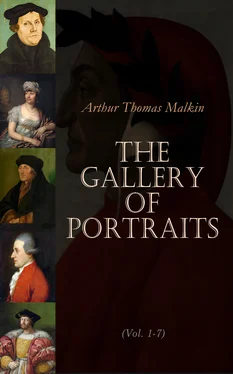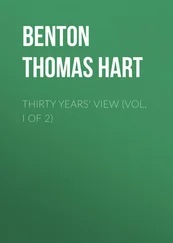The success of his operas at Hamburg produced a sum which enabled him to visit Italy. Florence was the first city in which he made any stay. He was there received in the kindest manner by the Grand Duke Giovanni Gaston de Medicis, and produced the opera of Rodrigo in 1709, for which he was presented with a hundred sequins, and a service of plate. Thence he proceeded to Venice, where he brought out Agrippina, which was received with acclamation, and performed twenty-seven nights successively. It seems that horns and other wind-instruments were in this opera first used in Italy as accompaniments to the voice. Here the charms of his music made an impression on the famous beauty and singer, Signora Vittoria, a lady particularly distinguished by the Grand Duke; but in this, as in every instance of a similar kind, Handel showed no disposition to avail himself of any partialities exhibited in his favour. His thoughts were nearly all absorbed by his art, and it is but just to conclude that he was also influenced by those sentiments of moral propriety which so distinctly marked his conduct through life. It is to be admitted, however, that he was too much inclined to indulge in the pleasures of the table.
On visiting Rome he was hospitably and kindly entertained by the Cardinal Ottoboni, a person of the most refined taste and princely magnificence. Besides his splendid collection of pictures and statues, he possessed a library of music of great extent, and kept in his service an excellent band of performers, which was under the direction of the celebrated Corelli. At one of the parties made by the Cardinal, Handel produced the overture to Il Trionfo del Tempo, which was attempted by the band so unsuccessfully, that the composer, in his hasty manner, snatched the violin from Corelli, and played the most difficult passages with his own hand. The Italian, who was all modesty and meekness, ingenuously confessed that he did not understand the kind of music; and, when Handel still appeared impatient, only said, “Ma, caro Sassone, questa musica è nel stilo Francese, di ch’io non m’intendo”—(“But, my dear Saxon, this music is in the French style, which I do not understand”). And so far Corelli was perfectly right; Handel’s overtures are formed after the model of Lully, though, it is hardly necessary to add, he improved what he imitated. This anecdote indicates the vast superiority in point of execution possessed by the moderns. A learner of two years’ standing would now play the violin part of any of Handel’s overtures at first sight, without a fault.
At Rome Handel composed his Trionfo del Tempo, the words of which were written for him by the Cardinal Pamphilii, and a kind of mystery , or oratorio, La Resurrezione. The former he afterwards brought out in London, with English words by Dr. Morell, under the title of the Triumph of Time and Truth. From Rome he went to Naples, where he was treated with every mark of distinction. But he now resolved, notwithstanding the many attempts made to keep him in Italy, to return to Germany; and in 1710 reached Hanover, where he found a generous patron in the Elector, who subsequently ascended the English throne as George I. Here he met the learned composer, Steffani, who, having arrived at a time of life when retirement becomes desirable, resigned his office of Maestro di Capella to the Elector, and Handel was appointed his successor, with a salary of 1500 crowns, upon condition that he would return to the court of Hanover at the termination of his travels.
Towards the end of 1710 Handel arrived in London. He was soon introduced at court, and honoured with marks of Queen Anne’s favour. Aaron Hill was then manager of the Italian opera, and immediately sketched a drama from Tasso’s Jerusalem, which Rossi worked into an opera under the name of Rinaldo, and Handel set to music. This was brought out in March, 1711; and it is stated in the preface that it was composed in a fortnight, a strong recommendation of a work to those who delight in the wonderful rather than in the excellent: but in fact there is nothing in this which could have put the composer to much expense either of time or thought. Handel undoubtedly wrote better operas than any of his contemporaries or predecessors; but he was controlled by the habits and taste of the day, and knew by experience that two or three good pieces were as much as the fashionable frequenters of the Italian theatre would listen to, in his time.
At the close of 1711 he returned to Hanover, but revisited London late in 1712; and shortly after was selected, not without many murmurs from English musicians, to compose a Te Deum and Jubilate on occasion of the peace of Utrecht. The Queen settled on him a pension of two hundred pounds as the reward of his labour—and as he was solicited to write again for the Italian stage, he never thought of returning to his engagement at Hanover, till the accession of the Elector to the British throne reminded him of his neglect of his royal employer and patron. On the arrival of George I. in London, Handel wanted the courage to present himself at court; but his friend, Baron Kilmansegge, had the address to get him restored to royal favour. The pleasing Water-Music , performed during an excursion made up the river by the King, was the means by which the German baron brought about the reconciliation; and this was accompanied by an addition of two hundred pounds to the pension granted by Queen Anne.
From the year 1715 to 1720, Handel composed only three operas. The three first years of this period he passed at the Earl of Burlington’s, where he was constantly in the habit of meeting Pope, who, though devoid of any taste for music, always spoke and wrote in a flattering manner of the German composer. The other two years he devoted to the Duke of Chandos, Pope’s Timon; and at Cannons, the Duke’s seat, he produced many of his anthems, which must be classed among the finest of his works, together with the greater number of his hautbois concertos, sonatas, lessons, and organ fugues.
A project was now formed by several of the English nobility for erecting the Italian theatre into an Academy of Music, and Handel was chosen as manager, with a condition that he should supply a certain number of operas. In pursuance of this, he went to Dresden to engage singers, and brought back with him several of great celebrity, Senesino among the number. His first opera under the new system was Radamisto, the success of which was astonishing. But there were at that time two Italian composers in London, Bononcini and Attilio, who till then had been attached to the opera-house, and were not without powerful supporters. These persons did not passively notice the ascendancy of Handel, and the insignificance into which they were in danger of falling; they persuaded several weak and some factious people of noble rank to espouse their cause, and to oppose the German intruder, as they called the new manager. Hence arose those feuds to which Swift has given immortality by his well-known epigram; and hence may be traced Handel’s retirement from a scene of cabal, persecution, and loss. The final result of this, however, was fortunate, for it led to the production of his greatest works, his oratorios, which not only amply compensated him for all the injury which his fortune sustained in this contest, but raised him to a height of fame which he could never have gained by his Italian operas.
The two contending parties, wishing to appear reasonable, proposed something like terms of accommodation: these were, that an opera in three acts should be composed by the three rivals, one act by each, and that he who best succeeded should for ever after take the precedence. The drama chosen was Muzio Scevola, of which Bononcini set the first act, Handel the second, and Attilio the third. Handel’s “won the cause,” and Bononcini’s was pronounced the next in merit. But, strange to say, though each no doubt strained his ability to the utmost in this struggle, not a single piece in the whole opera is known in the present day, or is, perhaps, to be found, except in the libraries of curious collectors.
Читать дальше












